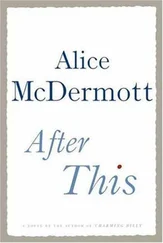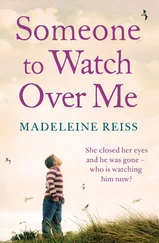Gabe, it seemed, had been telling them about Suffolk. His routine there. Tom and the girls—Susan perched on the arm of her father’s chair, Helen on the floor at his side, her legs crossed and her chin in her hands—were watching him solemnly. Matt Cain had leaned himself back against the corner of the couch, his arms spread out along the back and the side, his legs splayed—he had thick legs, long, with heavy thighs; he was altogether heavier than he seemed on first impression. He had his head turned a bit; he was picking a bit of tobacco from his tongue, but he’d been listening, too—amused or moved, it was hard to tell.
And I interrupted, breezing in to offer them another beer, coffee if it wasn’t too hot, meaning—intending, I knew, although I would not have said, in the moment before I spoke, that this was my intention—to graciously bring the night to a close. And wanting to kick myself in the second after I spoke when I saw, or heard, as if in some fading echo of the conversation I’d brought to a halt, that Gabe was telling them about his life at Suffolk and I had missed it.
Matt Cain pulled in his great big legs and leaned to the coffee table to put out his cigarette. “None for me, thanks,” he said. He placed his hands on his thighs and turned to my brother. “I should go,” he said. There seemed to be a thousand meanings conveyed in it. Gabe said, “I’ll walk you out.”
Matt Cain insisted on carrying his and Gabe’s beer glasses to the kitchen. He shook hands with me there, and with Tom and the two girls. I knew the smell of whatever he used on his hair would linger. As he started back through the dining room to the front door, Gabe caught his shoulder. He indicated the door to the carport. “Susan tells me this is the preferred means of egress and ingress,” Gabe said, and winked at me.
“I’ll put on the light,” I said.
Through the curtained glass in the door, I could see the two men pause. Gabe pointed to the ceiling of the carport and Matt Cain playfully bounced the hanging tennis balls off the windshield of Tom’s car. I heard them laugh, and I hoped in my heart there was no mockery in it. Not of Tom, I thought, who had lost a day of work to drive all the way out to Suffolk to fetch him. Who had driven out there a dozen times this year to sit in the men’s ward with him so he would not be alone. I watched them move away from the car, around the corner of the house to the driveway.
I finished up in the kitchen, and when Gabe hadn’t yet come in, I left a note on the dining-room table. Gone to bed. But don’t hesitate to knock if there’s anything you need. I added, Sleep well, choosing between it and We’re so glad you’re here.
The girls were in the basement, the television was on, and I called down to tell them, Not too late. Helen said, Susan’s already asleep, and Susan said sleepily, No, I’m not. Usually I left the basement door open so I could hear them when they came up, but tonight I closed it.
I went into my room. Tom was already in bed. He was reading a folded-back news magazine, his glasses perched on his nose. On these hot summer nights he slept in his shorts and a thin white tank shirt that exposed his fleshy shoulders, as pink and round as his head. He had the window fan on high and only looked up briefly when I came in, smiled vaguely. I went into the bathroom to brush my teeth and put on my summer nightgown. Then I crossed the room once more and turned the fan down to a low hum. I went through my fusty bedtime routine. Turned the clock around on my night table. Poured some hand cream into my palms and spread it up and down my arms. Placed a pale blue hairnet over the back of my head. Turned off the lamp that had been my mother’s in the old apartment and slipped off my glasses. The room contracted and lost every edge. I got into bed and, as was our routine, turned on my side to face Tom as he read. I closed my eyes. As was his routine, Tom lowered his arm to the mattress beside me, giving it to me. I put my two hands on his forearm, moved to put my lips to his skin.
I had turned the fan down low enough so that I could hear Gabe coming in and the girls coming up from the basement. Low enough, too, so that I could ask Tom what Gabe had said while I was in the kitchen, about his routine at Suffolk. Had he mentioned the electric shock? Had he talked about what had brought him there. That terrible day?
I closed my eyes and put my lips to my husband’s cool flesh, and he, still reading, brushed the back of his hand against my breast. I had not liked Gabe’s friend, and in my distaste, I had gone into the kitchen and lost out on what Gabe had said, about his routine at Suffolk. About what had brought him there. I had turned the fan down low enough so that I could now whisper, “Who was that guy, that friend of his?”
Tom flipped the magazine closed with one hand and placed it on his nightstand. He took his reading glasses off and leaned toward the light, keeping his arm on the mattress beside me, pulling away just a little to reach the cord. He sat back. It was his habit to ease himself into bed as a man might sink into a tub. He moved under the sheet just a little, keeping his back against the pillows that were piled against the headboard. Again, idly, he moved his hand against my breast.
“Do you remember Darcy Furlong?” he said into the darkness, just above the whirring of the fan. “From the brewery?”
I laughed. “That name,” I said.
I let go of his arm and rolled over on my back. He put his hand on my hip.
“Rumors went around about him for years,” he said. “Foolish things, mostly. Someone found him knitting in the lunchroom. There was supposed to be a tube of lipstick in his desk drawer. He wore polish on his toes—although some of us joked that, hell, if that was true, at least it meant that at some point he took off those damn saddle shoes.” He chuckled. “Nothing terrible, really. Just small, snide things said about him now and then. But Mr. Heep got wind of it, eventually. He always had one ear to the ground in that way. So Darcy was out sick for a while—some minor surgery, we all signed a card. And during this time Mr. Heep calls us in for a meeting. I told you about this.”
I nodded. I recalled it vaguely. “Mr. Heep said he was aware that there were certain kinds of rumors going around about Mr. Furlong and all he wanted to know was did anyone have any way to prove they were true? Anyone have proof? That’s all he asked. Of course, no one did. What in the world would serve as proof? We saw him in the office every day. He was a good worker. He came in on time in the morning and went home at night. He was a bachelor. His family lived down South. What else was there to know? And when no one answered, Mr. Heep said, ‘Well, neither do I, so until someone has proof, evidence, that what you have to say about Mr. Furlong is the absolute truth, I want the rumors to stop. I want an end to them. And I’ll fire the first man who defies me.’”
I heard the back door open and close. Heard, I was certain, Gabe pausing to lift my note from the dining-room table. I was aware of the coolness of my words—I had not written, after all, We are so glad you’re here.
I could hear Gabe’s footsteps on the bare floor of the living room as he crossed to the staircase. Tomorrow I would tell him again that he was welcome to stay.
“That was it,” Tom was saying. “The rumors stopped. Sure, everyone was free to continue to think what he liked, but no one said a word. I have to say, I admired Mr. Heep for the way he handled it. Put a stop to it. Whatever Darcy Furlong was—fairy or window dresser or momma’s boy, or just a lonely guy who liked fancy socks and his own routine—what good was to come of all of us talking about him? What were we going to discover? What were we going to change?”
Читать дальше












